History
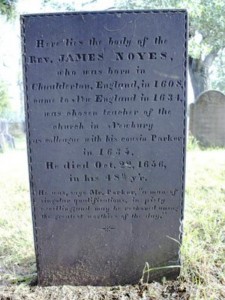 The Noyes side of Bob’s family was a family of prominence. The American side of the family begins with the Reverend William Noyes who was born in England in 1568. While William remained in England all his life, two of his children and a distant cousin left England and immigrated to America, settling in the Massachusetts area. The occupations included ministers of the Gospel, doctors, and commissioned army officers. One interesting fact is that in nearly every generation, there were two siblings who married siblings from another family. I have seen this is many families, including my own, and it makes me wonder if part of the reason is that there were fewer people around with children of suitable age to marry the children of a family. This might have been the case, especially when families began to move out west. In the history of the Noyes family that points out these siblings marrying siblings of another family, I find that Dr James III married Ann Sanford, who was the daughter of Governor Peleg and Mary Sanford, and his brother, Colonel Thomas Noyes married Ann’s sister, Elizabeth Sanford. While this is a bit unusual, it does happen, and there is nothing wrong with it. The fact that it happened about once a generation is a bit more unusual, but I guess it could be that these siblings had similar taste in mates.
The Noyes side of Bob’s family was a family of prominence. The American side of the family begins with the Reverend William Noyes who was born in England in 1568. While William remained in England all his life, two of his children and a distant cousin left England and immigrated to America, settling in the Massachusetts area. The occupations included ministers of the Gospel, doctors, and commissioned army officers. One interesting fact is that in nearly every generation, there were two siblings who married siblings from another family. I have seen this is many families, including my own, and it makes me wonder if part of the reason is that there were fewer people around with children of suitable age to marry the children of a family. This might have been the case, especially when families began to move out west. In the history of the Noyes family that points out these siblings marrying siblings of another family, I find that Dr James III married Ann Sanford, who was the daughter of Governor Peleg and Mary Sanford, and his brother, Colonel Thomas Noyes married Ann’s sister, Elizabeth Sanford. While this is a bit unusual, it does happen, and there is nothing wrong with it. The fact that it happened about once a generation is a bit more unusual, but I guess it could be that these siblings had similar taste in mates.
One of the main reasons that some of the Noyes men moved to American is the same as the reason that many of the first settlers came to America…religious differences with the Church of England. The United States has always been a country that prides itself of personal and religious freedoms. James, who is my husband, Bob’s 7th great grandfather, and who was born in England in 1608, married Sarah Brown, and they immigrated to America, and shortly thereafter, he became one of the founders of Newbury, Massachusetts, where he and his wife settled. He was a minister of the Gospel there for twenty years, and was very well liked in the area. His memory is still precious there to this day.
The Reverend James II, who is my husband, Bob’s 6th great grandfather, and who is the second son of James I and Sarah, followed in the footsteps of his dad, as a minister of the Gospel. His biggest claim to fame is that he bore an active part in the founding of Yale College, and his name was the first of “Ten of the principal ministers in the colony, nominated and agreed upon by general consent both of the ministers and people to stand as Trustees or Undertakers, to found, erect and govern a college.” He was selected to be one of the first trustees and founders of Yale. By this time he was an old man and lived in a remote part of the county, but his influence was considered essential to the undertaking. During his ministry he is noted to have baptized one thousand one hundred and seventy-six persons.
Deacon Noyes, who is the fifth son of Reverend James Noyes II, and Bob’s 5th great grandfather, married Dorothy Stanton, which is part of the 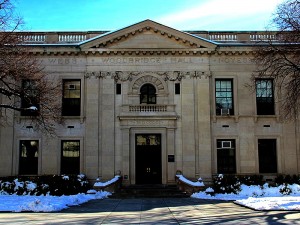 reason I have to wonder in there is a connection between my dad’s half brother’s mother, Edna Stanton, and Bob’s family through Dorothy Stanton. My grandfather, Allen Spencer, and Edna Stanton Spencer had a daughter, who they named Dorothy, and that along with the name Stanton, gives one reason to wonder. I am encouraged a little bit in my search, in that the Noyes family kept good family records. I hope this will be a useful when it comes to a possible connection between the Stantons of the Noyes family, and the Stanton of the Spencer family. Whatever happens, I find that the Noyes family were honorable people of distinction. They were active in their communities, loved and respected, making them a great American family.
reason I have to wonder in there is a connection between my dad’s half brother’s mother, Edna Stanton, and Bob’s family through Dorothy Stanton. My grandfather, Allen Spencer, and Edna Stanton Spencer had a daughter, who they named Dorothy, and that along with the name Stanton, gives one reason to wonder. I am encouraged a little bit in my search, in that the Noyes family kept good family records. I hope this will be a useful when it comes to a possible connection between the Stantons of the Noyes family, and the Stanton of the Spencer family. Whatever happens, I find that the Noyes family were honorable people of distinction. They were active in their communities, loved and respected, making them a great American family.
 Most people know that Princess Diana married Prince Charles, and for a lot of people that is the extent of the Spencer ties to the British Aristocracy. That assumption couldn’t be further from the truth. The Spencer family is one of Britain’s preeminent aristocratic families. In the family line, there have been knights, baronets, and members of the royal family. Hereditary titles include dukedom of Marlborough, earldom of Sunderland, as well as Spencer and Churchill viscountcy. Of course, the two most well known members were Sir Winston Churchill and Princess Diana, with the current addition of Princes William and Henry, and now George.
Most people know that Princess Diana married Prince Charles, and for a lot of people that is the extent of the Spencer ties to the British Aristocracy. That assumption couldn’t be further from the truth. The Spencer family is one of Britain’s preeminent aristocratic families. In the family line, there have been knights, baronets, and members of the royal family. Hereditary titles include dukedom of Marlborough, earldom of Sunderland, as well as Spencer and Churchill viscountcy. Of course, the two most well known members were Sir Winston Churchill and Princess Diana, with the current addition of Princes William and Henry, and now George.
So the question remains, how did this family rise to wealth, or were they born into it? The answer is that the Spencer family rose to wealth from humble beginnings. A close relative of Henry Spencer who died in 1478, was John Spencer who in 1469 had become a feudal lord of Wormleighton in Warwickshire and a tenant of the now famous to most people, Altrop in Northamptonshire in 1486. His nephew, Sir John Spencer, who died in 1522, first made a living trading in livestock and other commodities. He was able to save enough money to purchase both the Wormleighton and Altrop lands, and the estate of Altrop with its moated house and several hundred acres of farmland. The family grazed sheep on the land. As time went on, he purchased more and more land. He then rebuilt the Altrop house in 1508 and it became the family home for the  next nineteen generations. By the 16th century the Spencer family had entered Parliament in the person of Sir Robert Spencer (1570 – 1627) who represented Brackley in Parliament. He was made a Knight of the Garter and created Baron Spencer of Wormleighton in 1601. During the reign of King James I, Sir Robert Spencer was reputed to be the richest man in England.
next nineteen generations. By the 16th century the Spencer family had entered Parliament in the person of Sir Robert Spencer (1570 – 1627) who represented Brackley in Parliament. He was made a Knight of the Garter and created Baron Spencer of Wormleighton in 1601. During the reign of King James I, Sir Robert Spencer was reputed to be the richest man in England.
There were those in the British aristocracy, such as the more established Howard and FitzAlan ancestors, who didn’t approve of the Spencer’s rise to wealth through sheep herding, and who tried to act more officially aristocratic, but they were shot down in a heated debate when Lord Spencer replied, “When my ancestors, as you say, were keeping sheep, your ancestors were plotting treason.” I’m sure this did not go over well, but apparently, they were not able to dispute that accusation, and so the subject was dropped. There have been countless other Spencers in the British Parliament, as well as the House of Commons. The Spencer family has been influential in much of the lawmaking in England, as well as in the area of British economics.
I guess I don’t quite understand why the other aristocratic families didn’t like the way that the Spencer family rose to wealth, but I think that in the area of wealth and politics, the old money and old political families often 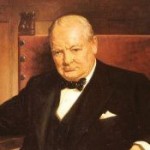 don’t like having new upstarts invading their supposed territory. I don’t think it is much different in any country. The wealthy families tend to like their power and prestige, and really don’t want to share those things much. I seriously doubt that they ever gave any thought to where their own wealth came from. Later, after the upstart families are established, they simply have to accept it. It reminds me of the unsinkable Molly Brown on the Titanic. The established money didn’t like her marrying into her money. They didn’t feel like she belonged, but she didn’t care, and she was nevertheless a force to be reckoned with, so they had to treat her with respect. That is what has had to happen with the Spencer family, and now, their aristocracy is no longer questioned by any of the British aristocratic families.
don’t like having new upstarts invading their supposed territory. I don’t think it is much different in any country. The wealthy families tend to like their power and prestige, and really don’t want to share those things much. I seriously doubt that they ever gave any thought to where their own wealth came from. Later, after the upstart families are established, they simply have to accept it. It reminds me of the unsinkable Molly Brown on the Titanic. The established money didn’t like her marrying into her money. They didn’t feel like she belonged, but she didn’t care, and she was nevertheless a force to be reckoned with, so they had to treat her with respect. That is what has had to happen with the Spencer family, and now, their aristocracy is no longer questioned by any of the British aristocratic families.
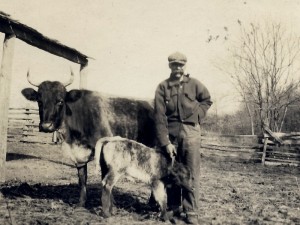 My great grandfather, William Malrose Spencer I, was a hard working man, who had a lot of stress in his life. It is my understanding that he was a stern man, which was probably common for the times, but my guess is that he was a Type A personality. These days, we know that high stress and a Type A personality are sure fire ways to an early grave. I can’t say that my great grandfather died what would be considered an early death in 1922, but these days, it certainly would be considered young. He was 64 years old, when he dropped dead of a heart attack right after hauling a bunch of logs up to a fence so they could be used for repairs around the farm.
My great grandfather, William Malrose Spencer I, was a hard working man, who had a lot of stress in his life. It is my understanding that he was a stern man, which was probably common for the times, but my guess is that he was a Type A personality. These days, we know that high stress and a Type A personality are sure fire ways to an early grave. I can’t say that my great grandfather died what would be considered an early death in 1922, but these days, it certainly would be considered young. He was 64 years old, when he dropped dead of a heart attack right after hauling a bunch of logs up to a fence so they could be used for repairs around the farm.
On first glance at the picture of him with his cows, I saw a strong man taking care of his animals. But this picture was taken just a short time before Great Grandpa’s death. How could a man look so strong one day, 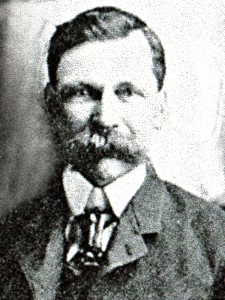 and be dead of a heart attack just a short time later. Upon closer examination, I noticed that he was smoking a pipe. I suppose that his smoking could have contributed to a heart attack…especially when added to his Type A personality and high stress lifestyle. So many things that can contribute to an early death, were virtually unknown to people just a few years ago.
and be dead of a heart attack just a short time later. Upon closer examination, I noticed that he was smoking a pipe. I suppose that his smoking could have contributed to a heart attack…especially when added to his Type A personality and high stress lifestyle. So many things that can contribute to an early death, were virtually unknown to people just a few years ago.
These days, while we don’t always pay attention to the experts on health issues, we are told what things can be detrimental to our health. Quite possibly, if my great grandfather had known what things he was doing that were likely to lead to a heart attack, he would have lived his life a little differently. These days too, we know about things like CPR, aspirin, blood thinners, and heart medications. Any one of those things could have prolonged his life…even after the heart attack. Unfortunately, none of these things was available…or at least not in the current forms that we have these days. So when the heart attack happened, Great Grandpa was simply gone in the blink of an eye. It is entirely possible that when the attack happened, he was alone, and that nothing could have been done when he was discovered, but just as many people in those days have had their heart stop and no one knew what to do, so they died even though there were people with them. While mouth to mouth resuscitation was first introduced in 1740 to save a drowning victim, CPR was not developed 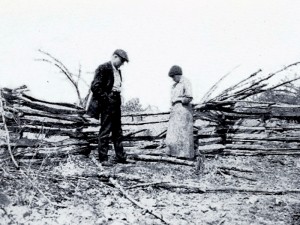 until 1960. Before that, if there was no heartbeat, it was all over.
until 1960. Before that, if there was no heartbeat, it was all over.
It seems so sad to me that people back then died when there was often a simple way to resuscitate them and save their life. People simply didn’t know it. Those techniques had not come about yet. I’m sure that when people learned of those things later, they felt a twinge of sadness over the loss of a loved one who might have been saved has they lived in a different day and age. I know that as new technology comes about now, I feel sad for those who could have been helped by it, but there is nothing that can be done now. It was how things were in that time.
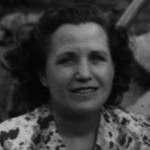 When my great aunt, Bertha Schumacher Hallgren wrote her journal, she said that, “making a record of the simple, everyday things you see, feel, and hear around you – and passing them on to posterity” would make you famous. It seems such a simple thing, and yet, whether Bertha was famous in her time or not, her journal has definitely been read by many people now, so I guess she was famous with the people who mattered. Aren’t her family members among the most important ones to read her writings. I think they are. Bertha said to write about the simple everyday things. That really is something that can have an impact on the reader.
When my great aunt, Bertha Schumacher Hallgren wrote her journal, she said that, “making a record of the simple, everyday things you see, feel, and hear around you – and passing them on to posterity” would make you famous. It seems such a simple thing, and yet, whether Bertha was famous in her time or not, her journal has definitely been read by many people now, so I guess she was famous with the people who mattered. Aren’t her family members among the most important ones to read her writings. I think they are. Bertha said to write about the simple everyday things. That really is something that can have an impact on the reader.
In her journal, Bertha talks about the first family car. It was brand new, and state of the art…and they paid $650.00 for it. When we buy a new car now, $650.00 seldom covers the monthly payment. The car itself costs upward of $31,000.00, and could cost much more. I realize that wages were much smaller when Bertha was a girl, but I have to wonder if she would just about pass out if she heard the cost of a car now. When people put gasoline in their car in 1925 they paid approximately 20 cents a gallon. These days $3.35 is pretty good for gas prices, and in some places, they pay as much as $4.35. And that is just today. Gas prices have gone up and down, and has been $6.00 a gallon before. I doubt if people from 1925 ever thought we would end up paying that kind money for gasoline today. We, of course, would love to be able to buy gasoline for 20 cents a gallon, but those days are gone forever.
When we look back on the prices of things in history, I think most are likely in proportion with the wages, for the most part. But, when we look at the difference in the prices of things, we seldom think about the wage difference. We just wonder how they expect people to pay such a horrible price for these things. I think it doesn’t occur to us that most likely we are making more money and so the prices of things aren’t really so far  out of line with the wages we make. Gas prices, especially hit hard, because the people of the United States are a very mobile people. We like our cars, and we want to be able to go when we want, and where we want. And, sometimes, that price at the pump starts eating into our ability to do that. We get annoyed.
out of line with the wages we make. Gas prices, especially hit hard, because the people of the United States are a very mobile people. We like our cars, and we want to be able to go when we want, and where we want. And, sometimes, that price at the pump starts eating into our ability to do that. We get annoyed.
I would love to be able to pay $650.00 for a new car like my great grandfather did years ago, but if you don’t mind, I would like to keep my wages right where they are when I buy that new car. That would make the price of that new car very appealing indeed…just not realistic. Whether we like it or not, the prices of things often have a pretty direct correlation with the wages of the day, and we will have to deal with it.
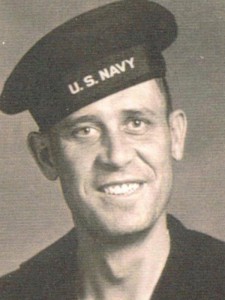 Because he passed away in 1953 at the young age of just 43 years. I never had the opportunity to know my Great Uncle Cliff. My mom tells me that he was well liked. She said he liked to make people laugh, and always had a good joke to tell. That made him someone people liked to be around. He loved stopping by his brother’s house after work. He would leave a few snacks in his lunch pail for all the little kids to raid. Of course, that made him a big hit with my mom and her siblings.
Because he passed away in 1953 at the young age of just 43 years. I never had the opportunity to know my Great Uncle Cliff. My mom tells me that he was well liked. She said he liked to make people laugh, and always had a good joke to tell. That made him someone people liked to be around. He loved stopping by his brother’s house after work. He would leave a few snacks in his lunch pail for all the little kids to raid. Of course, that made him a big hit with my mom and her siblings.
Uncle Cliff was quite a character. He loved to pick on his mom some. When he was younger, and still living at home. He had a job, and his job required that he work a half day on Saturday. Sometimes he would not come right home after work, because he knew his mother would think he was out drinking. Grandma was mad, and indeed thought he was drinking. She decided to write a big “D” on calendar…for drunk. I guess she was hoping to shame him into not doing such things. He did it to tease her, because he wasn’t drinking at all, and the big “D” on the calendar only served as a source of humor for him.
Uncle Cliff married Marie Settell on July 28, 1940, and on their wedding night, the family gave them a real Shivaree. Now for those of you who don’t know, a Shivaree is a mock serenade with kettles, pans, horns, and other noisemakers given for a newly married couple. As sometimes happens in these event, things can get out of hand, resulting in the bride being stolen from the groom for a time, and Uncle Cliff was very worried that they would steal his bride. I suppose that once he realized they weren’t going to do that, he might have thought it was a sweet thing to do, but by that time the Shivaree was over, so he couldn’t relax and enjoy it.
When the United States joined World War II, Uncle Cliff was drafted into the Navy on August 18, 1945, at the age of 36 years. He had only been married five years at that time, and they had already had some sadness in the loss of their first child, Clifford Jr in 1941. I can only imagine how hard it would be to send your husband into war, when you had only been married for five years. But then, many woman have had to do this over the years. They and their marriage would survive the war, and they would have three surviving children, Joy, Gordon, and Judy and a number of grandchildren, but unfortunately, Uncle Cliff would never get to meet them.
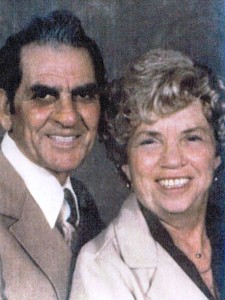 Coming home from the war would not bring the best of news. I’m not sure just how long after coming home, but Uncle Cliff had some health issues, and he unfortunately put off taking care of them, In the end, it would be cancer that would take his life at the far too young age of 43. Uncle Cliff has always seemed to be a bit of a mystery to me…like an great uncle who I knew should have known, but somehow didn’t. He was a missing part of the family. He was my Grandpa Byer’s youngest sibling, and since I knew my grandpa, who was the third from the oldest of the nine children, why wouldn’t I know his youngest brother. Oh, I know that isn’t such an oddity, because a lot of people die at a young age, but it seemed strange to me at the time.
Coming home from the war would not bring the best of news. I’m not sure just how long after coming home, but Uncle Cliff had some health issues, and he unfortunately put off taking care of them, In the end, it would be cancer that would take his life at the far too young age of 43. Uncle Cliff has always seemed to be a bit of a mystery to me…like an great uncle who I knew should have known, but somehow didn’t. He was a missing part of the family. He was my Grandpa Byer’s youngest sibling, and since I knew my grandpa, who was the third from the oldest of the nine children, why wouldn’t I know his youngest brother. Oh, I know that isn’t such an oddity, because a lot of people die at a young age, but it seemed strange to me at the time.
Five years after Uncle Cliff’s passing, Marie would again find love, even though I’m sure she thought it would never happen. She married Walter Oddsey (Johnny) Skaggs. Marie and Johnny were both well liked by the Byer family, and while they moved to California, they kept in touch with them through the years.
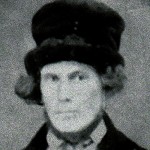 My great great grandfather, Allen Spencer and my great great grandmother, Lydia Quackenbush Potts Spencer were married on February 22, 1850 in Canastota, New York. It didn’t take them too many years to decide that New York was not where they wanted to be. So, in the spring of 1855, after the birth of their second child, Ida, who was born June 11, 1854, they packed up their belongings and their two children, and headed west. They had their hearts set on Iowa. It would be a long journey, traveling on dirt roads, camping underneath the stars, cooking over a campfire, and often going for days without seeing other people. They would have had to cross rivers with no bridges, traveling for miles sometimes before finding a place where it was safe to take the covered wagon across. Then traveling back to where they had been before. They would have most likely crossed the Mississippi at Prairie Du Chien, which was the only place north of Saint Louis to have a ferry at that time. I imagine that it seemed very odd to be around what seemed like so many people again. Then, probably after a few days, they set off again for their dream home…Iowa. It is unsure if they arrived in Iowa in 1855, or if they wintered in Prairie Du Chien before going on in the spring of 1856, but apparently Iowa was not quite what they expected, because it was not long before the family would again move…this time to Wisconsin. My great grandfather, William was born in Iowa on August 27, 1857, but by the time their next child, Luther was born on May 18, 1858, the family was living in Wisconsin.
My great great grandfather, Allen Spencer and my great great grandmother, Lydia Quackenbush Potts Spencer were married on February 22, 1850 in Canastota, New York. It didn’t take them too many years to decide that New York was not where they wanted to be. So, in the spring of 1855, after the birth of their second child, Ida, who was born June 11, 1854, they packed up their belongings and their two children, and headed west. They had their hearts set on Iowa. It would be a long journey, traveling on dirt roads, camping underneath the stars, cooking over a campfire, and often going for days without seeing other people. They would have had to cross rivers with no bridges, traveling for miles sometimes before finding a place where it was safe to take the covered wagon across. Then traveling back to where they had been before. They would have most likely crossed the Mississippi at Prairie Du Chien, which was the only place north of Saint Louis to have a ferry at that time. I imagine that it seemed very odd to be around what seemed like so many people again. Then, probably after a few days, they set off again for their dream home…Iowa. It is unsure if they arrived in Iowa in 1855, or if they wintered in Prairie Du Chien before going on in the spring of 1856, but apparently Iowa was not quite what they expected, because it was not long before the family would again move…this time to Wisconsin. My great grandfather, William was born in Iowa on August 27, 1857, but by the time their next child, Luther was born on May 18, 1858, the family was living in Wisconsin.
Having driven through Iowa recently, I can say that it is pretty flat, and at least to me, not very interesting. I suppose it was a matter of what you were looking for. Farming country wasn’t exactly what this city girl had in mind for life, which is probably why I chose to stay in Wyoming…country enough to be small and city enough to have things to do. Still, Iowa does appeal to a lot of people and in the end, it must have appealed to my great great grandparents again, because Webster City, Iowa would be where my great great grandfather, Allen Spencer would pass away, and where he is buried. My great great grandmother, Lydia Quackenbush Potts 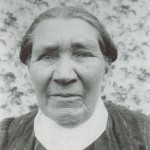 Spencer would again move on, this time to Fay, Oklahoma, where her sons lived and would pass away there twenty three years after the passing of her husband, Allen Spencer, and after seeing her many grandchildren.
Spencer would again move on, this time to Fay, Oklahoma, where her sons lived and would pass away there twenty three years after the passing of her husband, Allen Spencer, and after seeing her many grandchildren.
I don’t know if they found the winters in Wisconsin too harsh, the growing season too short, or exactly what drew them back to Iowa, but I guess it was their dream in the beginning and their dream in the end…or at least until Allen’s death. Then maybe Lydia could no longer bear to stay, or maybe she only left because of her sons. I’ll probably never know for sure, but I can relate to being near family…especially after a loss, so that is my guess as to what my great great grandmother would have wanted.
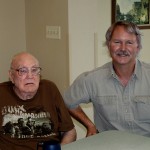
 Kids seem to think that they are invincible. I don’t know where they got such an idea, but they often take chances without giving a second thought to how dangerous something might be and whether or not they will get hurt…or worse, killed. It has been the same way throughout time, I think. Recently, while visiting my Uncle Bill Spencer, his son Bill asked him if, while walking across a railroad trestle, they had ever encountered a train. Uncle Bill confirmed that they had, and when asked what they did, he said, “We dropped under the trestle and hung on until the train had gone over.” He said that it really shook. Well, I don’t mind saying that my uncle’s revelation made my blood run cold, but when I later mentioned that to my cousin Laurie Carlson Stepp, she told me that she had done that too, and that I shouldn’t tell her mother about it. Well, Laurie, I don’t think your mom gats to read my stories, so I have kept my promise, I think. Laurie told me that all the kids she knew did that, and never gave a thought to whether or not it might be dangerous. Yes, I’m sure that’s right. Kids don’t think about stuff like that. They are invincible…right?
Kids seem to think that they are invincible. I don’t know where they got such an idea, but they often take chances without giving a second thought to how dangerous something might be and whether or not they will get hurt…or worse, killed. It has been the same way throughout time, I think. Recently, while visiting my Uncle Bill Spencer, his son Bill asked him if, while walking across a railroad trestle, they had ever encountered a train. Uncle Bill confirmed that they had, and when asked what they did, he said, “We dropped under the trestle and hung on until the train had gone over.” He said that it really shook. Well, I don’t mind saying that my uncle’s revelation made my blood run cold, but when I later mentioned that to my cousin Laurie Carlson Stepp, she told me that she had done that too, and that I shouldn’t tell her mother about it. Well, Laurie, I don’t think your mom gats to read my stories, so I have kept my promise, I think. Laurie told me that all the kids she knew did that, and never gave a thought to whether or not it might be dangerous. Yes, I’m sure that’s right. Kids don’t think about stuff like that. They are invincible…right?
My dad and Uncle Bill, and possibly even my Aunt Ruth, did the same thing. They never gave it a thought…or not that they would admit. When I think about the trestle they were on when the trains came over, the distance to the ground from there, and the fact that there was only a creek at the bottom of that trestle…I cringe. It might be my extreme dislike of heights, or it could be that hanging under a railroad trestle while a train is going over is…seriously crazy!! Nevertheless, you can’t tell kids how dangerous or crazy something is, because they know everything…right! My dad and my Uncle Bill, I have learned over the years, were certain that they were invincible. They messed around with dynamite, walked on railroad trestles, jumped on the trains even though they had a pass, and countless other stunts that make me cringe, but somehow both lived to tell about it…but I’m quite sure they didn’t tell their mother either.
A lot of the chances kids take in driving their cars can be pretty dangerous too. Things like four wheeling up a 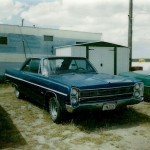
 steep hill. I have seen video after video of people rolling their vehicle trying that one. I’ve never tried that, but I can say that I’ve driven my car much faster than I should have. I think I’ll decline to say how fast, because my mother does read my stories every day, and since I have to see her pretty often, I don’t really want her to shoot me. I can say, Mom, that it was only one time, I was 18, and even my friends told me to slow down. After that, I decided that taking that kind of stupid chance with my life and the lives of my friends wasn’t worth any thrill it might have given. Like most kids, I’m wiser now.
steep hill. I have seen video after video of people rolling their vehicle trying that one. I’ve never tried that, but I can say that I’ve driven my car much faster than I should have. I think I’ll decline to say how fast, because my mother does read my stories every day, and since I have to see her pretty often, I don’t really want her to shoot me. I can say, Mom, that it was only one time, I was 18, and even my friends told me to slow down. After that, I decided that taking that kind of stupid chance with my life and the lives of my friends wasn’t worth any thrill it might have given. Like most kids, I’m wiser now.
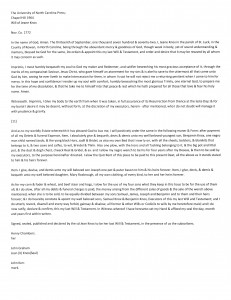 When I think of my husband, Bob’s 6th great grandmother, Jean Gracy Knox, I always think of Ellen O’Hara…Scarlett O’Hara’s mother, in Gone With The Wind. They lived in different eras, but in many ways, their lives were much the same. I can’t say, for certain, that Jean Knox lived on a plantation, but I do know that like many people in the 1700’s she owned slaves. With that in mind, I have to assume that she ran their home or plantation in much the way that Ellen O’Hara had. I don’t know much about her, of course, but her will seemed to be written by a woman who was used to being in charge. I know that she was a slave owner, because in her will, she mentions what is to be done with a young slave boy and a female slave that she owned. That and the extensive collection of clothing that she left her daughter, Mary indicates that she was a woman of wealth.
When I think of my husband, Bob’s 6th great grandmother, Jean Gracy Knox, I always think of Ellen O’Hara…Scarlett O’Hara’s mother, in Gone With The Wind. They lived in different eras, but in many ways, their lives were much the same. I can’t say, for certain, that Jean Knox lived on a plantation, but I do know that like many people in the 1700’s she owned slaves. With that in mind, I have to assume that she ran their home or plantation in much the way that Ellen O’Hara had. I don’t know much about her, of course, but her will seemed to be written by a woman who was used to being in charge. I know that she was a slave owner, because in her will, she mentions what is to be done with a young slave boy and a female slave that she owned. That and the extensive collection of clothing that she left her daughter, Mary indicates that she was a woman of wealth.
It’s possible that her “take charge” attitude came from the fact that her husband passed away fourteen years before she did, and six months before their youngest child was born. She had no choice but to take charge of things. She still had five children under the age of sixteen in her home. I’m certain that her older sons helped her out too, but from what I have gathered from her will, she was very much in control of her life, children, and property. I wish I had a picture of her, but in my mind, she probably looked much like Ellen O’Hara did, in Gone With The Wind. Beautiful, and very ladylike, and yet, she ran the household and even helped out the neighbors when necessary. Of course, I could be wrong on all that, but from what I have read of her will, she knew exactly what she wanted done after her passing. The will appears to have been written just days before her death. They assumed this from the fact that she made her mark on it, and not her signature, even though she could read and write. In looking at the will, of which I only have a word for word copy of the wording as it was written…including all the spelling errors, I at first thought that maybe she couldn’t read and write, but later discovered that it was not written by her. She just dictated it to someone else to write up and then signed it in front of witnesses, much like we would do today in front of a attorney. This could also have been an indication of wealth, and the power that one assumes to have because of it.

I also know, that Jean was a woman of strong faith. She was a Presbyterian, and most likely left her native Ireland because of disputes between the Presbyterians, also known as Covenanters, and the Church of England. The Knox family is among those who were persecuted because of their religion, and that some had to leave their homes in the middle of the night to escape death. They came to America seeking religious freedom. That in itself would take a person of strong character, and may have been part of what made Jean Gracy Knox into a woman who was well able to handle the things that came her way. Jean’s life was not long, by today’s standards anyway, but in that day and age, she did live a long time, and it is my opinion that she also did a lot of living during her lifetime. I’m sure that I will never really know the whole story of her life, but I will always believe that she was quite a lady.

 I always liked the fact that I was born in Superior, Wisconsin. It was where my dad was born, and I suppose that could have been part of its charm, but I really think it just seemed exotic or romantic to me. I know that sounds funny, but there is so much history in the area, with a bit of mystery mixed in. The mystery comes from all the shipwrecks in Lake Superior, in my mind anyway. When I think of Lake Superior, my mind always wanders to the shipwrecks that have occurred there, and the fact that Lake Superior, while beautiful, has a dark and dangerous side for any ship caught out on her in a storm…especially a November gale, and especially an early November gale, such as in 1975. When the Edmond Fitzgerald was caught out there in an early gale on November 10th, she sank with all hands lost because it. I remember my Uncle Bill telling me about that storm, years later, and the fact that he was driving around the lake at the time of the sinking. He told me that it was a horrific storm, and he was not surprised to hear of the loss of a ship.
I always liked the fact that I was born in Superior, Wisconsin. It was where my dad was born, and I suppose that could have been part of its charm, but I really think it just seemed exotic or romantic to me. I know that sounds funny, but there is so much history in the area, with a bit of mystery mixed in. The mystery comes from all the shipwrecks in Lake Superior, in my mind anyway. When I think of Lake Superior, my mind always wanders to the shipwrecks that have occurred there, and the fact that Lake Superior, while beautiful, has a dark and dangerous side for any ship caught out on her in a storm…especially a November gale, and especially an early November gale, such as in 1975. When the Edmond Fitzgerald was caught out there in an early gale on November 10th, she sank with all hands lost because it. I remember my Uncle Bill telling me about that storm, years later, and the fact that he was driving around the lake at the time of the sinking. He told me that it was a horrific storm, and he was not surprised to hear of the loss of a ship.
Of course, the shipwrecks are not the only things I find to be exotic and romantic about the Lake Superior area. 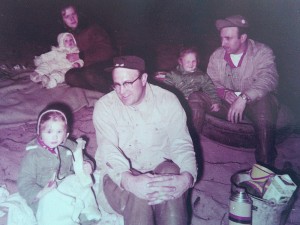 The fact that ships come into the Duluth-Superior Harbor from all over the world and that things that are shipped out of that harbor go all over the world, makes it feel more connected to the world somehow. My cousin, Pam’s husband, Mike Wendling, who worked for the railroad for many years, before retiring, told us that the trains would bring in coal from Gillette, Wyoming and Montana. It is strange to think that the coal we see in railroad cars here is headed for an ore boat on Lake Superior…and then places all over the world.
The fact that ships come into the Duluth-Superior Harbor from all over the world and that things that are shipped out of that harbor go all over the world, makes it feel more connected to the world somehow. My cousin, Pam’s husband, Mike Wendling, who worked for the railroad for many years, before retiring, told us that the trains would bring in coal from Gillette, Wyoming and Montana. It is strange to think that the coal we see in railroad cars here is headed for an ore boat on Lake Superior…and then places all over the world.
When I look at some of the pictures of me as a baby, I almost feel a bit like I missed out on some parts of my own babyhood. My sister, Cheryl remembers living there, playing with our cousin, Pam and the neighbor kids…including the last name of her favorites, the Lawlers. I don’t remember them. I was too young. With movies and pictures, I have been able to get a picture in my mind of what my life there must have been like. Most of it was likely spent being a third wheel to my sister and cousin, but it doesn’t look like they minded me too much. I was probably too little to be very bratty then. There were also trips to the lake with the family, which I didn’t know about really until my cousin, Pam produced a picture in her baby album during our visit. It was such a great family moment, at the lake when the smelt were running. Smelt are a type of fish who, like the salmon swim against the current to lay their eggs. People went out and gathered lots of them. It was a big deal on the lake.
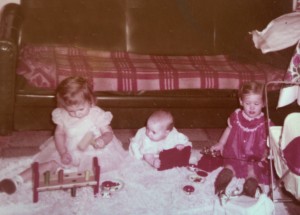
I probably get most of my memories of Superior, Wisconsin from our many visits back there when we were kids. Even then, I felt like it was a special thing to be born there. Maybe it was just about not being born in Casper, Wyoming. Don’t get me wrong, I love Casper, but when you are born somewhere other than the place you grew up, it just has a different feel. I’m sure most smaller city or small town kids think that their little corner of the world it the most dull and boring place ever. It tends to make any other place take on an exotic feel. Nevertheless, I will always feel like there is something exotic and romantic about being born on the tip of Lake Superior.
 When I come across a husband and wife, who both died on the same day, my curiosity kicks into overdrive. That just seems so unusual. Nevertheless, such was the case for my husband, Bob’s 4th great grandparents, Cloudsbury and Elizabeth Kirby, both of whom died on August 29, 1878 in Mount Ayr, Ringgold County, Iowa. At first, I wondered if it was an error, and I suppose it could be, but that is the information I have at this point, so that is what I have to go with.
When I come across a husband and wife, who both died on the same day, my curiosity kicks into overdrive. That just seems so unusual. Nevertheless, such was the case for my husband, Bob’s 4th great grandparents, Cloudsbury and Elizabeth Kirby, both of whom died on August 29, 1878 in Mount Ayr, Ringgold County, Iowa. At first, I wondered if it was an error, and I suppose it could be, but that is the information I have at this point, so that is what I have to go with.
My first thought was to check for disasters in the area, like tornados, fires, or floods, but I was unable to find anything that specifically happened in Mount Ayr, Iowa on August 29, 1878. Looking for these kinds of specific things can be a long and frustrating process, but I just can’t imagine too many situations where both halves of a couple would pass on the same day. I searched and found that there were tornadoes during that year, but nothing specifically on that day, so I doubt that a tornado is the culprit here.
When the possibility of a disaster was removed, I began to think about illness, so I looked up and epidemics in the area. That is when I came across a definite possibility…the Yellow Fever Epidemic of 1876 to 1878, which took many lives in the southern United States. Yellow fever, known historically as yellow jack or yellow plague is an acute viral disease, that is usually spread by the female mosquito. Symptoms include fever, chills, loss of appetite, nausea, muscle pains particularly in the back, and headaches. Many people improve after a few days, but when the symptoms return, they can cause kidney damage, liver failure (causing yellow skin, probably the reason for the name Yellow Fever), bleeding, and ultimately death. These days there is a vaccine against Yellow Fever and some countries require it for travelers. Other countries try to control the virus by killing off as many mosquitoes as possible. Nevertheless, Yellow Fever causes 200,000 infections and 30,000 deaths every year with nearly 90% of those occurring in Africa, these days. Since the 17th century, several major outbreaks have occurred in America, Africa, and Europe. In the 18th and 19th centuries yellow fever was seen as the most dangerous of infectious diseases.
I can’t say for sure that Yellow Fever is what took the lives of Bob’s 4th great grandparents, but with the epidemic that occurred during that time, I have to think that it is a possibility. I have looked at the lists of people know to have died of Yellow Fever during that epidemic, and did not see Cloudsbury and Elizabeth Kirby on the list, but the list was incomplete, with many people only listed as a number. At this time, unless more information somehow surfaces, I will probably never know for sure, but the epidemic, which apparently came in from Cuba caused 100,000 people to become ill, and killed 20,000 people, so it is likely that they were too busy, trying to help people get better, to keep really great records as to the names of the dead. I have to feel really sorry for people of that time. They didn’t really know what was causing the epidemic and would not have had a way to do much about it anyway, so many lives were lost. Thankfully for the people of this century, Yellow Fever can be prevented by vaccination, and it is usually found in Africa, so we don’t really see much of it here.

